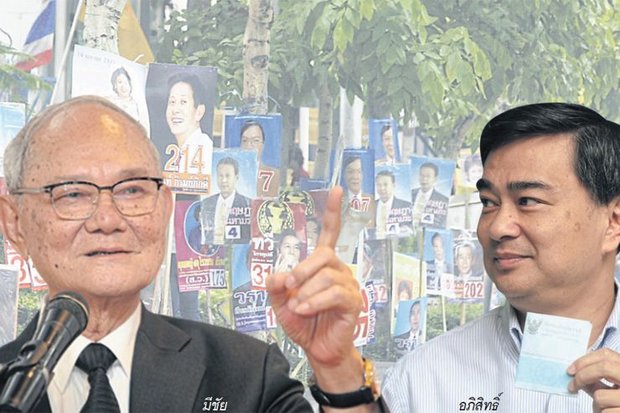
The Constitution Drafting Committee (CDC) defended the new voting system on Sunday, following growing criticism from political parties that it is designed to weaken an elected government.
The new system will add up the votes parties receive in all constituencies nationwide to determine the percentage of party-list MP seats each is allocated.
Politicians claim the new model will prevent major parties from gaining a majority of House seats and being able to form a single-party government. This could result in multi-party coalitions which are seen as lacking political stability.
CDC chairman Meechai Ruchupan said the system is designed to make sure that every vote cast on election day counts. Unlike the old first-past-the-post system, votes cast for losing constituency candidates will still be used to calculate the number of party-list seats.
Mr Meechai was referring to the formula to be used to calculate party-list seats to ensure the threshold of 150.
The total number of MPs is capped at 500, 350 of whom are elected from constituencies and 150 coming from the party list.
He also dismissed as "speculation" the criticism that no party will win enough seats to form a single-party administration.
"If a party gets many votes, those votes will be counted and used in the allocation of the House seats. But of course the party can't get more from the party list than its proportion of votes even if it wins a landslide victory," he said.
The CDC chairman also said politicians' concerns cannot force any changes because the new voting system is included in the new charter while the organic bill only specifies the details.
"The calculation isn't difficult and it will be done by election officials," he said.
Mr Meechai said the voting system also has another key feature which is equally important, pointing out that "no" votes (spoiled votes) will not be wasted as the proposals require constituency MP candidates to win more votes than the total number of "no" votes, to qualify for a constituency MP seat.
Pheu Thai's Chusak Sirinil insisted Sunday the new voting system is designed to cripple major parties, and when combined with other conditions such as the qualifications and the nomination of the prime minister, the new system is designed to allow the National Council for Peace and Order (NCPO) a prolonged stay in power.
The Democrat Party, on the other hand, warned the new voting system is not foolproof and politicians can come up with a strategy to undermine it.
Democrat deputy leader Nipit Intarasombat said a large party will use the tactic of dividing itself into smaller parties to contest elections, only to form a coalition government later.
This can help win as many as 250 seats, he said.
However, he said the elected government will face a stability crisis due to the 250-seat senate, which is appointed by the regime.
Nikorn Chamnong, director of Chartthaipattana Party, echoed Mr Niphit's view that the elected government will lack political stability.
"What will happen is that the elected government is weak. And despite the problems it [the voting system] can't be fixed because it's part of the charter," he said.